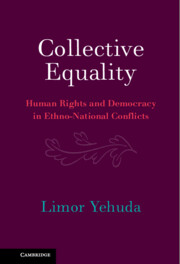Book contents
- Collective Equality
- Collective Equality
- Copyright page
- Dedication
- Contents
- Maps
- Acknowledgments
- 1 Introduction
- Part I Human Rights and Democracy in Deeply Divided Places
- Part II Revisiting Assumptions
- Part III Collective Equality
- 7 Collective Equality
- 8 Collective Equality and Sustaining Peace
- 9 Collective Equality and International Law
- 10 Conclusion
- Bibliography
- Index
10 - Conclusion
from Part III - Collective Equality
Published online by Cambridge University Press: 20 April 2023
- Collective Equality
- Collective Equality
- Copyright page
- Dedication
- Contents
- Maps
- Acknowledgments
- 1 Introduction
- Part I Human Rights and Democracy in Deeply Divided Places
- Part II Revisiting Assumptions
- Part III Collective Equality
- 7 Collective Equality
- 8 Collective Equality and Sustaining Peace
- 9 Collective Equality and International Law
- 10 Conclusion
- Bibliography
- Index
Summary
In recent decades international and regional human rights norms have been increasingly applied to constitutional provisions, revealing significant tensions between primary political arrangements, such as power-sharing institutions, and human rights norms. This book argues that these tensions, generally framed as a peace versus justice dilemma, are built on an individualistic conception of justice that fails to account for the meaning and requirements of justice in deeply divided places, which are characterized by ethnically based political exclusion and inequalities.
By introducing the concept of collective equality as a new theoretical basis for the law of peace, this book proposes a new approach for dealing with the tensions between peace-related arrangements and human rights. Through principled, pragmatic, and legal reasoning, the book develops a new paradigm that captures more accurately what democracy and human rights mean and require in the context of ethno-national conflicts, and provides potent guidance for advancing justice and peace in such places.
Keywords
- Type
- Chapter
- Information
- Collective EqualityHuman Rights and Democracy in Ethno-National Conflicts, pp. 289 - 298Publisher: Cambridge University PressPrint publication year: 2023



